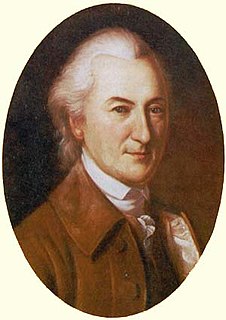A Quote by Henry Fielding
Good-nature is that benevolent and amiable temper of mind which disposes us to feel the misfortunes and enjoy the happiness of others, and, consequently, pushes us on to promote the latter and prevent the former; and that without any abstract contemplation on the beauty of virtue, and without the allurements or terrors of religion.
Related Quotes
Tis a barbarous temper, and a sign of a very ill nature, to take delight in shocking any one: and, on the contrary, it is the mark of an amiable and a beneficent temper, to say all the kind things one can, without flattery or playing the hypocrite,--and what never fails of procuring the love and esteem of every one; which, next to doing good to a deserving object who wants it, is one of the greatest pleasures of this life.
Reasoning from the common course of nature, and without supposing any new interposition of the Supreme Cause, which ought always to be excluded from philosophy; what is incorruptible must also be ingenerable. The soul, therefore, if immortal, existed before our birth: And if the former existence noways concerned us, neither will the latter.
A tender-hearted and compassionate disposition, which inclines men to pity and feel the misfortunes of others, and which is, even for its own sake, incapable of involving any man in ruin and misery, is of all tempers of mind the most amiable; and though it seldom receives much honor, is worthy of the highest.
[Prudence] is the virtue of that part of the intellect [the calculative] to which it belongs; and . . . our choice of actions will not be right without Prudence any more than without Moral Virtue, since, while Moral Virtue enables us to achieve the end, Prudence makes us adopt the right means to the end.
Is there no virtue among us? If there be not, we are in a wretched situation. No theoretical checks-no form of government can render us secure. To suppose that any form of government will secure liberty or happiness without any virtue in the people, is a chimerical idea, if there be sufficient virtue and intelligence in the community, it will be exercised in the selection of these men. So that we do not depend on their virtue, or put confidence in our rulers, but in the people who are to choose them.
Sorrow and happiness are the heresies of virtue; joy and anger lead astray from TAO; love and hate cause loss of virtue. The heart unconscious of sorrow and happiness - that is perfect virtue. One, without change - that is perfect repose. Without any obstruction - that is the perfection of the unconditioned. Holding no relations with the external world, - that is perfection of the negative state. Without blemish of any kind, - that is the perfection of purity.
Kings or parliaments could not give the rights essential to happiness... We claim them from a higher source - from the King of kings, and Lord of all the earth. They are not annexed to us by parchments and seals. They are created in us by the decrees of Providence, which establish the laws of our nature. They are born with us; exist with us; and cannot be taken from us by any human power, without taking our lives.
There is nothing so charming as the knowledge of literature; of that branch of literature, I mean, which enables us to discover the infinity of things, the immensity of Nature, the heavens, the earth, and the seas; this is that branch which has taught us religion, moderation, magnanimity, and that has rescued the soul from obscurity; to make her see all things above and below, first and last, and between both; it is this that furnishes us wherewith to live well and happily, and guides us to pass our lives without displeasure and without offence.
Instead of loving a God, we love each other. Instead of the religion of the sky-the religion of this world-the religion of the family-the love of husband for wife, of wife for husband-the love of all for children. So that now the real religion is: Let us live for each other; let us live for this world without regard for the past and without fear for the future. Let us use our faculties and our powers for the benefit of ourselves and others, knowing that if there be another world, the same philosophy that gives us joy here will make us happy there.





































